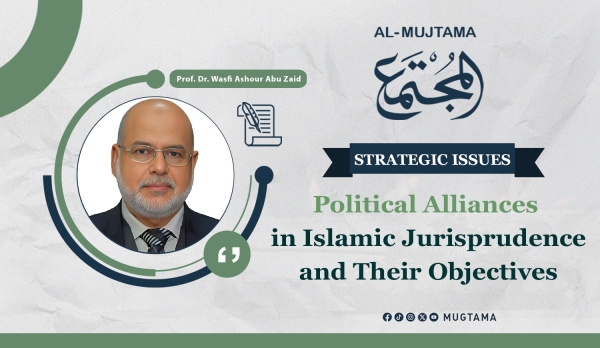Political Alliances in Islamic Jurisprudence and Their Objectives Featured
In the field of Sharia politics, scholars have identified the principle of bringing about benefits and preventing harm as its foundation. Imam Al-Izz Ibn Abdul Salam built all Sharia rulings upon this principle and made it his theoretical framework in understanding Sharia, both in rulings and objectives.
This does not mean granting unchecked freedom in politics to pursue any self-defined interest. Political interests must align with the guidelines set by Sharia. These interests are not defined by political parties, groups, states, organizations, or institutions, but by the principles and rulings specified in Sharia itself. Here, Sharia politics does not succumb to personal whims or desires but adheres to the firm pillar of Sharia rulings and interests, as defined by divine authority rather than human whims. There are also specific rulings within Sharia politics that apply to such matters.
One of the important issues in Sharia politics is the matter of political alliances between states, movements, or parties, whether with Muslims or non-Muslims.
Definition of Alliances:
In Sharia politics, an alliance is defined as an agreement between two parties to achieve mutual public benefit. Historically, alliances in pre-Islamic times often involved conflict and tribal warfare, which Islam prohibited, as the Prophet (peace be upon him) said: “There is no alliance in Islam.” However, alliances formed to support the oppressed, such as the "Hilf al-Mutayyibin," were upheld and strengthened by Islam. The Prophet (peace be upon him) said about such alliances, “Any alliance from the pre-Islamic period that was based on supporting the oppressed is only reinforced by Islam.”
Thus, in Sharia politics, alliances should be based on Islamic rulings to achieve the broader public interests of Muslims and protect them from harm.
The Ruling on Forming Political Alliances According to the Qur'an and Sunnah:
The default ruling on forming alliances is permissibility because the original state of things is that they are allowed unless proven otherwise. Such alliances are transactions intended to benefit Muslims rather than acts of worship. Alliances may even rise to the level of being recommended or obligatory if they serve essential purposes, such as protecting Muslims or preventing imminent harm.
The Qur'an emphasizes honoring agreements and contracts, with verses such as:
- (O you who have believed, fulfill [all] contracts) (Al-Ma’idah: 1).
- (And those who fulfill their promise when they promise) (Al-Baqarah: 177).
- (Except for those who reach a people between yourselves and whom is a treaty) (An-Nisa’: 90).
- (But if they seek help of you for the religion, then you must help them, except against a people between yourselves and whom is a treaty) (Al-Anfal: 72).
These verses collectively affirm the legitimacy of alliances and agreements.
The Sunnah also supports this ruling. The Prophet (peace be upon him) participated in alliances like the "Hilf al-Fudul," aimed at defending the oppressed. He praised such alliances, saying, “I witnessed an alliance at the house of Abdullah Ibn Jud'an. I would not trade it for red camels, and if I were called to it in Islam, I would respond.”
The Prophet (peace be upon him) also formed alliances with the Jews and other groups. Despite some of these groups later breaking their treaties, alliances remained a legitimate and effective practice. The Prophet allied with the tribe of Khuz’a, negotiated with Banu Ghatafan, and made agreements for strategic purposes during critical events such as the Battle of the Trench. These examples affirm that alliances are backed by both the Qur'an and Sunnah.
Objectives of Political Alliances in Sharia Politics:
The formation of alliances serves specific goals and purposes when conducted according to Sharia principles derived from the Qur'an and Sunnah. Key objectives include:
- Demonstrating the Flexibility and Tolerance of Islamic Sharia: Permitting alliances between Muslims, non-Muslims, and even adversaries highlights the tolerance and adaptability of Islamic Sharia. Islam accommodates alliances if they achieve legitimate interests or repel greater harm.
- Strengthening Muslim Unity: Alliances aim to consolidate Muslim ranks in the face of threats, reinforcing unity and solidarity. A strong Muslim front deters enemies, as the Qur'an states: (And prepare against them whatever you are able of power...to terrify thereby the enemy of Allah and your enemy) (Al-Anfal: 60).
- Achieving Victory for Islam and Muslims: Strengthened unity brings Muslims closer to victory. While victory ultimately comes from Allah, alliances serve as a means to achieve it, as stated: (And victory is not but from Allah, the Exalted in Might, the Wise) (Al Imran: 126).
- Maximizing Benefits and Minimizing Harm: The permissibility of alliances in Sharia stems from the principle of achieving benefits and preventing harm, which Ibn Taymiyyah described as central to Sharia’s foundation.
- Expanding Islamic Outreach and Cooperation: Alliances help broaden the scope of Islamic interaction, showcasing the inclusivity and flexibility of Sharia. They facilitate cooperation to repel greater threats and effectively spread the message of Islam.


